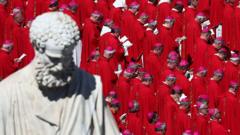The upcoming conclave represents an intersection of faith, tradition, and intense scrutiny as cardinals navigate both religious duties and external influences in the election of a new pope.
Conclave: The Secrets Behind the Papal Election Process

Conclave: The Secrets Behind the Papal Election Process
As 130 cardinals prepare to choose the next pope, a deep dive into the meticulously secretive conclave unfolds.
In just a few days, 133 cardinals will enter the storied Sistine Chapel in Rome, shrouded in a veil of secrecy unprecedented in modern governance. Each cardinal will take an oath on the gospels to maintain confidentiality regarding the proceedings of their election of a new pope, following the passing of Pope Francis. The promise of "absolute and perpetual secrecy" extends to everyone within the Vatican's walls—including medical staff and support personnel—who are committed to safeguarding the integrity of this sacred process.
To ensure this dramatic selection remains free from outside interference, radiant microphones and electronic surveillance devices will be thoroughly searched for. John Allen, editor of Crux, explains that jammers are deployed to block any phone or Wi-Fi signals. The Vatican's rigorous measures illustrate the high stakes involved, reflecting a belief that the decision is divinely inspired rather than swayed by worldly politics.
Upon entering the conclave, all electronic gadgets are deposited, including smartphones and smart watches. The environment mirrors a total lockdown, designed to prevent external distractions that could influence the deliberations. “The logic is trust but verify,” Allen noted, emphasizing the Vatican's meticulous approach to ensuring seclusion.
For those not yet secluded in the conclave, however, the atmosphere outside is rife with speculation and excitement. Reporters are buzzing in anticipation, attempting to glean insights from cardinal sightings and private discussions, with articles drawing attention to elite dinners and social gatherings of the "princes of the church" leading up to the vote.
Among the nearly 250 cardinals gathered in Rome, only those under 80 will cast votes. The elections culminate in a religious decision that commands not only ecclesiastical authority but also significant global influence; thus, the stakes run high. The media plays a dual role, fueling speculation and scrutiny while attempting to navigate the cardinal candidacies and alliances forming behind the scenes.
While some cardinals may have their constituencies, opinions, and desired outcomes, the official line remains one of unity and divinely guided discussion. The intense environment surrounding the conclave, marked by uncertainty and high-level lobbying, belies the outward tranquility displayed by the electors.
As the day of voting approaches, currents of camaraderie among the cardinals could spark unexpected outcomes, reminding observers that a single, inspired discussion can reshape the future leadership of a complex global institution. The conclave will begin its session cloaked in security and spirituality, encapsulating the delicate balance of faith, governance, and worldwide attention.
To ensure this dramatic selection remains free from outside interference, radiant microphones and electronic surveillance devices will be thoroughly searched for. John Allen, editor of Crux, explains that jammers are deployed to block any phone or Wi-Fi signals. The Vatican's rigorous measures illustrate the high stakes involved, reflecting a belief that the decision is divinely inspired rather than swayed by worldly politics.
Upon entering the conclave, all electronic gadgets are deposited, including smartphones and smart watches. The environment mirrors a total lockdown, designed to prevent external distractions that could influence the deliberations. “The logic is trust but verify,” Allen noted, emphasizing the Vatican's meticulous approach to ensuring seclusion.
For those not yet secluded in the conclave, however, the atmosphere outside is rife with speculation and excitement. Reporters are buzzing in anticipation, attempting to glean insights from cardinal sightings and private discussions, with articles drawing attention to elite dinners and social gatherings of the "princes of the church" leading up to the vote.
Among the nearly 250 cardinals gathered in Rome, only those under 80 will cast votes. The elections culminate in a religious decision that commands not only ecclesiastical authority but also significant global influence; thus, the stakes run high. The media plays a dual role, fueling speculation and scrutiny while attempting to navigate the cardinal candidacies and alliances forming behind the scenes.
While some cardinals may have their constituencies, opinions, and desired outcomes, the official line remains one of unity and divinely guided discussion. The intense environment surrounding the conclave, marked by uncertainty and high-level lobbying, belies the outward tranquility displayed by the electors.
As the day of voting approaches, currents of camaraderie among the cardinals could spark unexpected outcomes, reminding observers that a single, inspired discussion can reshape the future leadership of a complex global institution. The conclave will begin its session cloaked in security and spirituality, encapsulating the delicate balance of faith, governance, and worldwide attention.



















